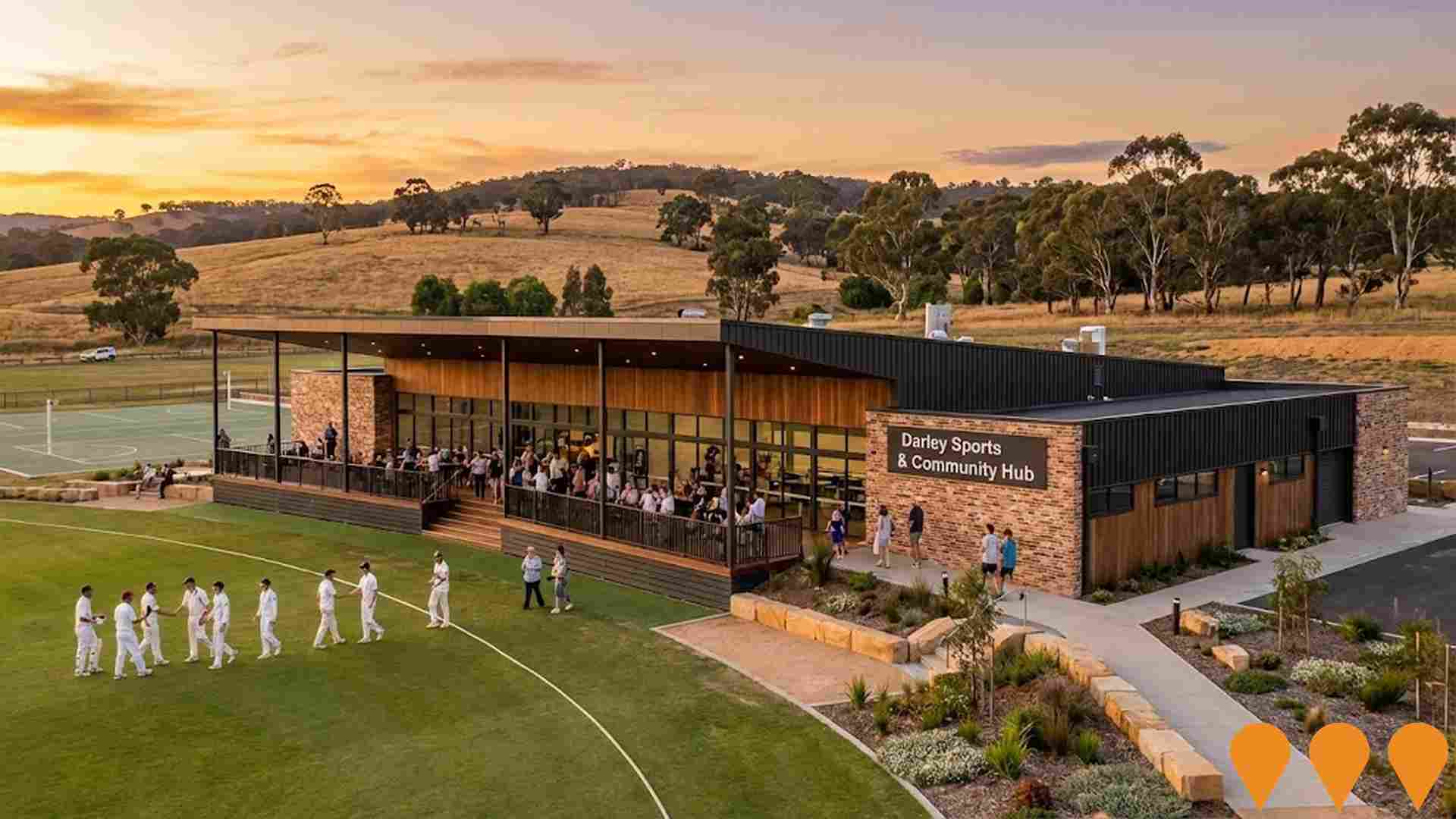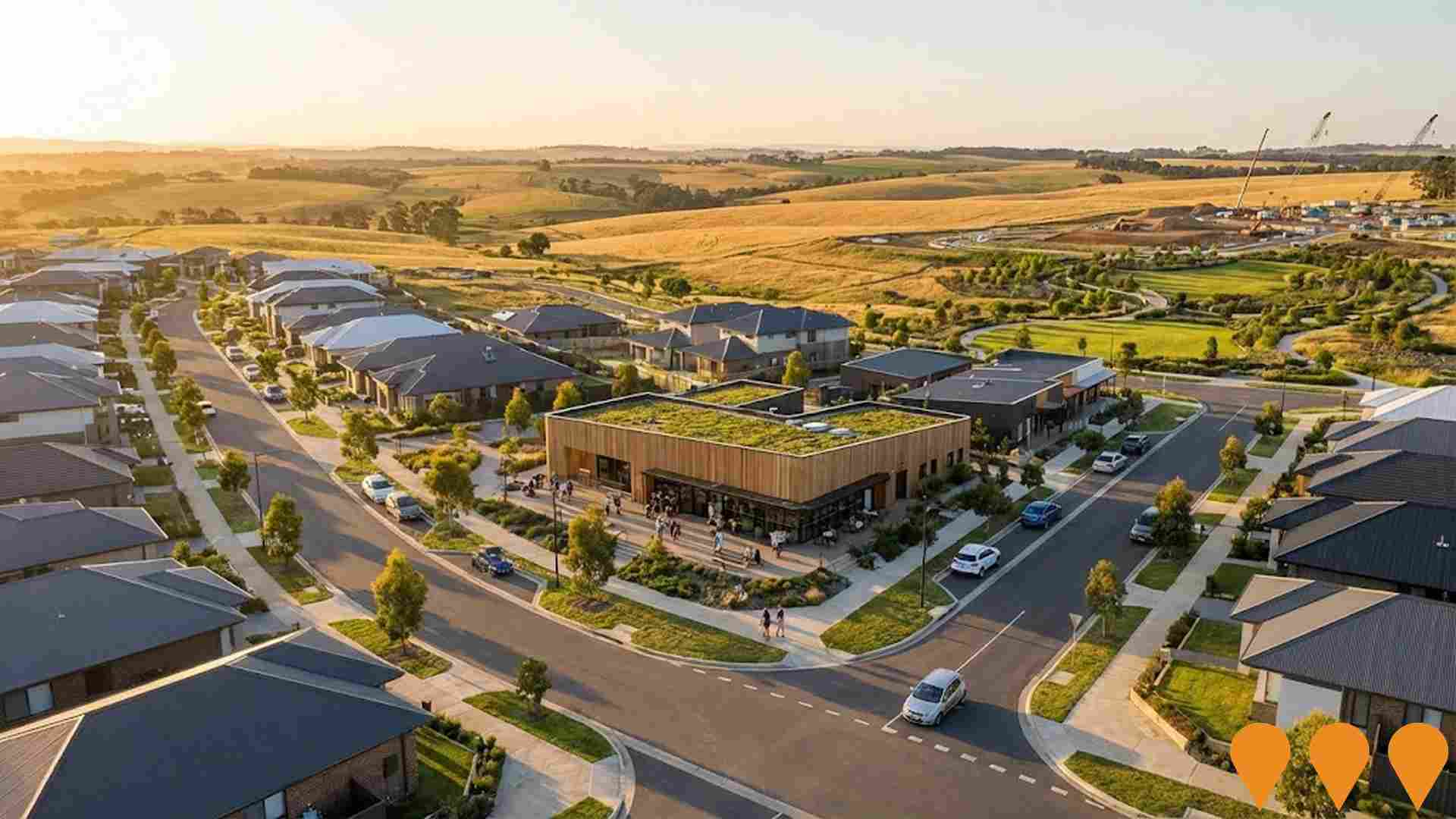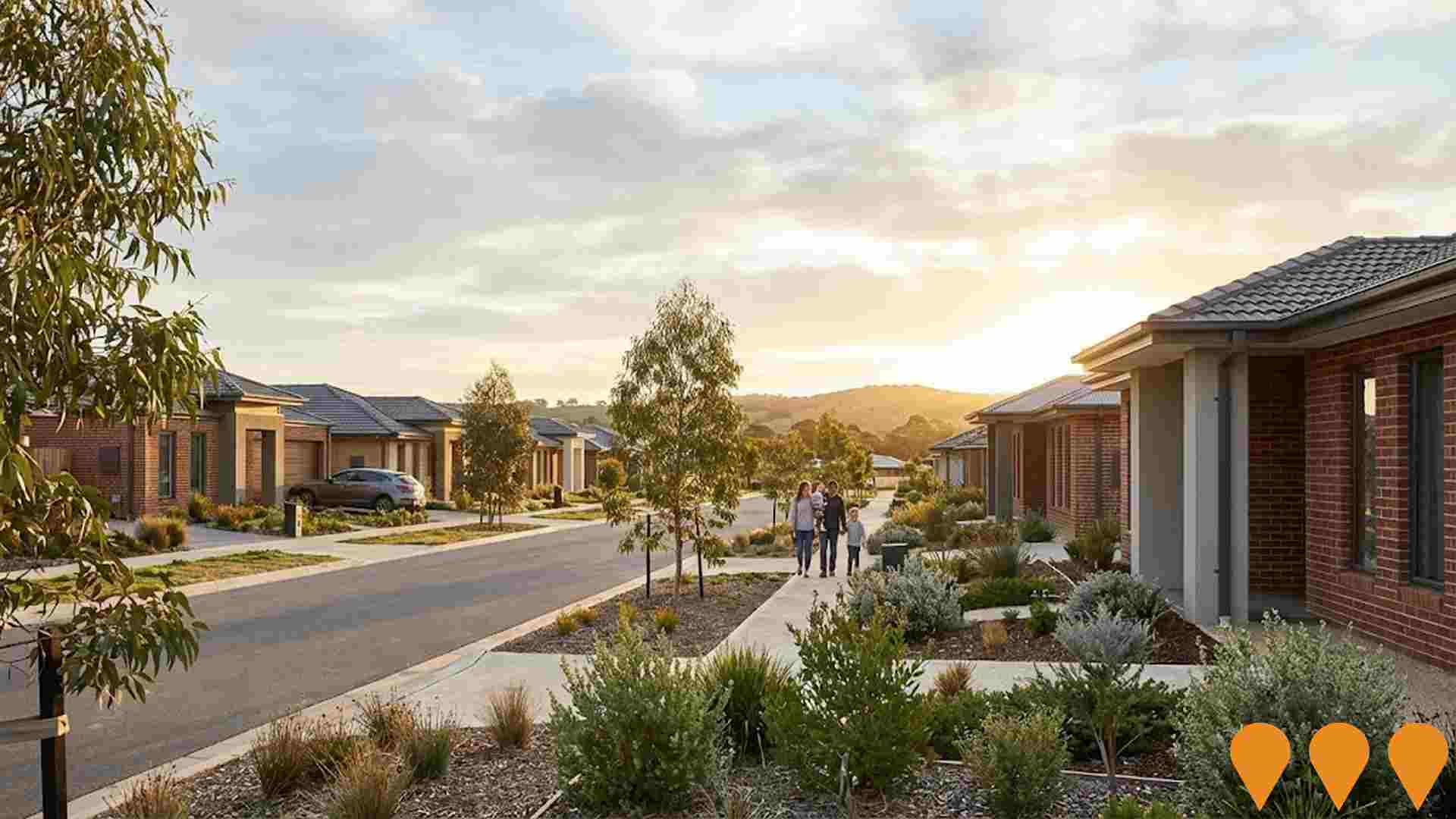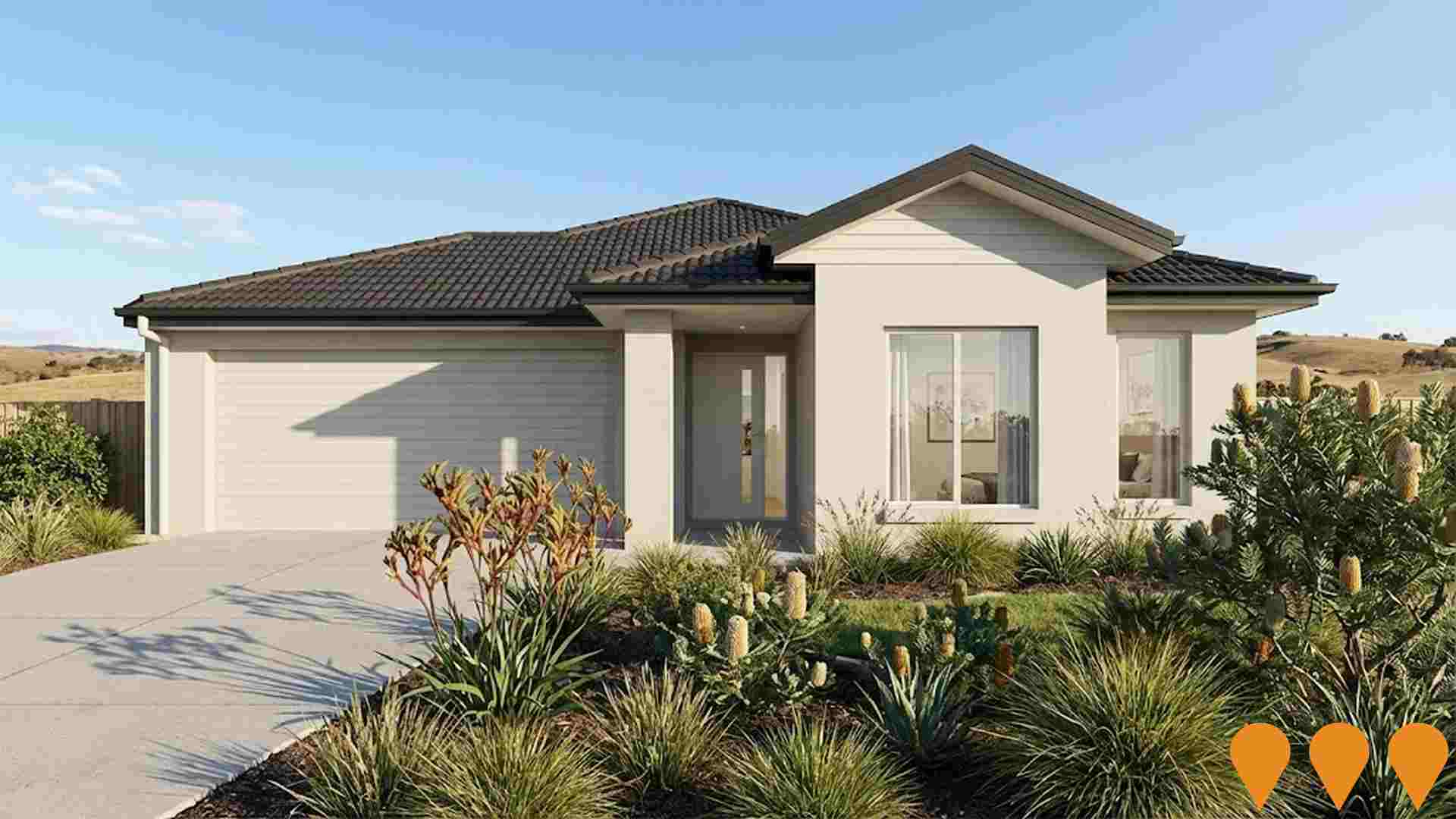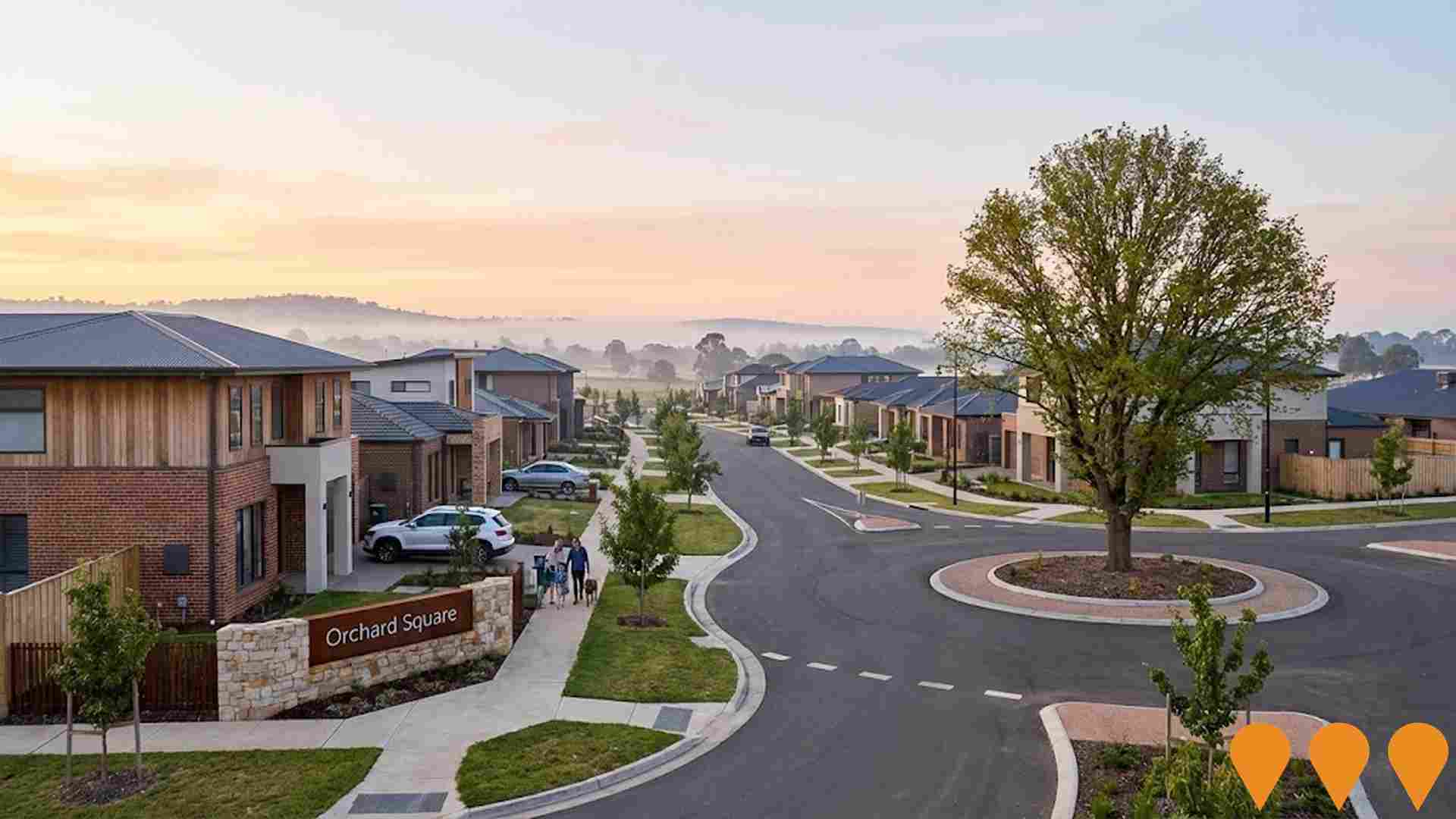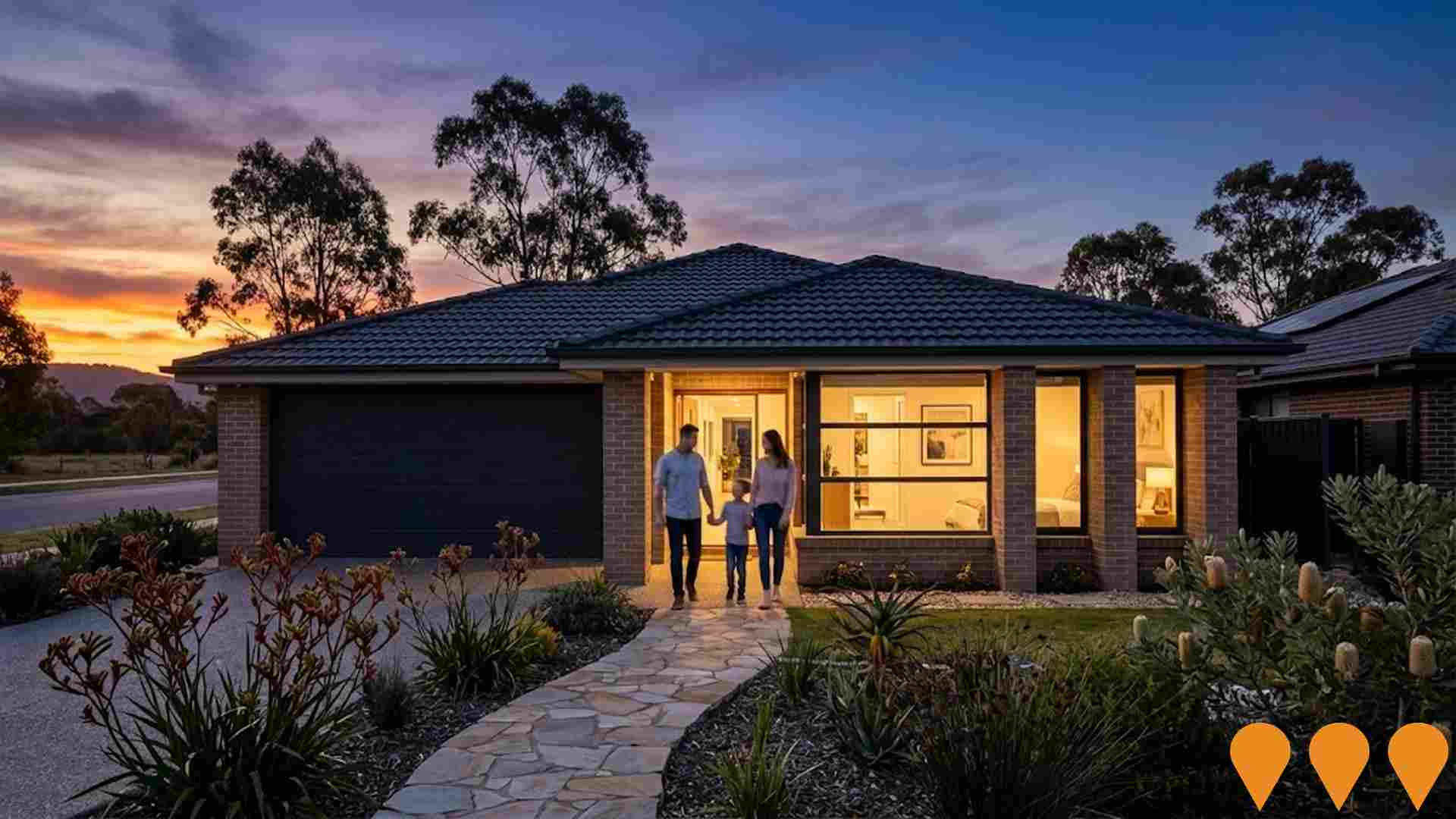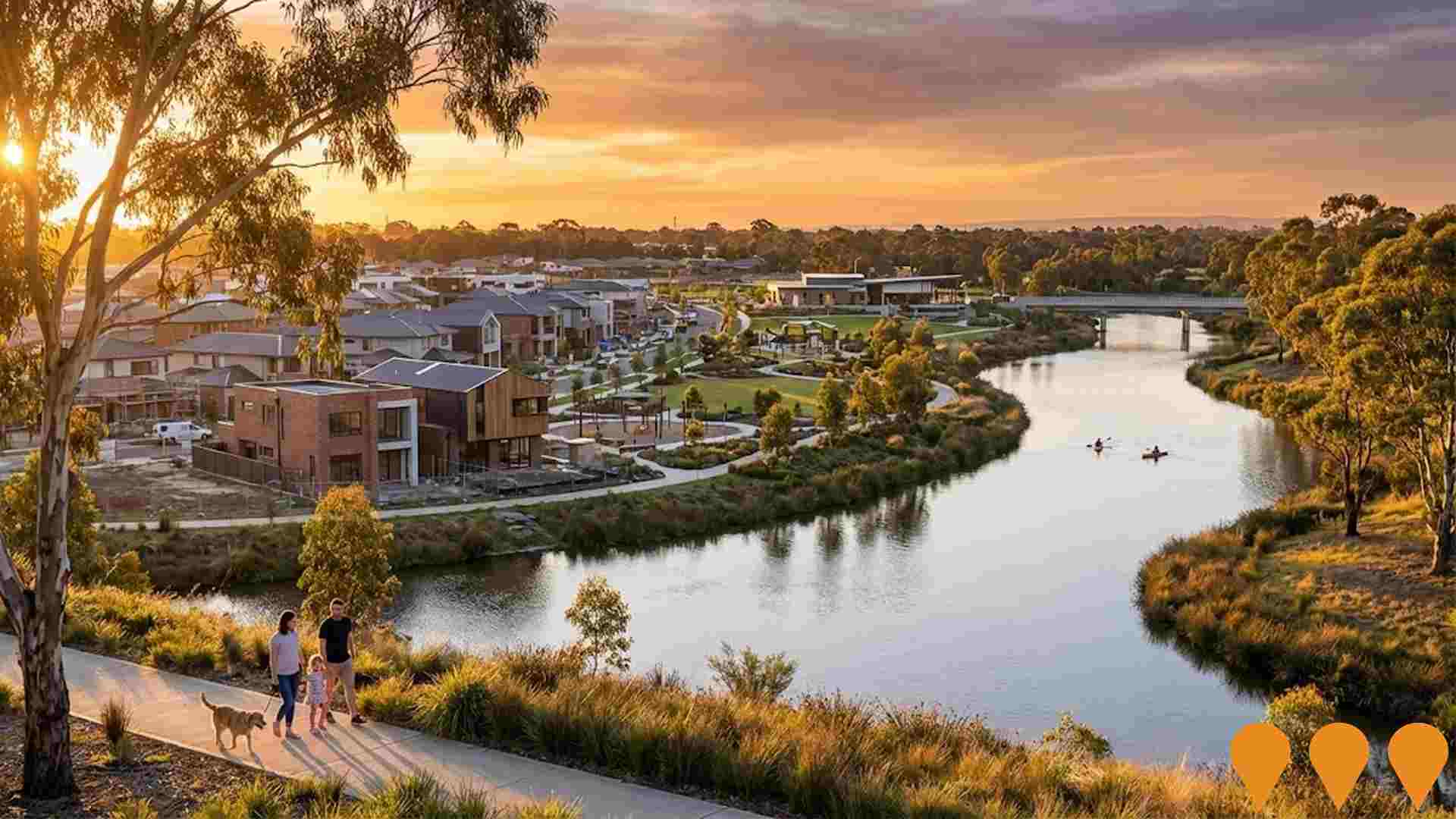Chart Color Schemes
est. as @ -- *
ABS ERP | -- people | --
2021 Census | -- people
Sales Activity
Curious about local property values? Filter the chart to assess the volume and appreciation (including resales) trends and regional comparisons, or scroll to the map below view this information at an individual property level.
Find a Recent Sale
Sales Detail
Population
Bacchus Marsh lies within the top quartile of areas nationally for population growth performance according to AreaSearch analysis of recent, and medium to long-term trends
Bacchus Marsh's population is approximately 27,234 as of November 2025. This represents an increase of 2,517 people, a 10.2% rise from the 2021 Census figure of 24,717. The growth is inferred from ABS data showing an estimated resident population of 26,578 in June 2024 and an additional 1,233 validated new addresses since the Census date. This results in a density ratio of 138 persons per square kilometer. Bacchus Marsh's growth exceeded both national (8.9%) and state averages since the 2021 census, positioning it as a regional growth leader. Interstate migration contributed approximately 48% to overall population gains during recent periods.
AreaSearch uses ABS/Geoscience Australia projections for each SA2 area, released in 2024 with a base year of 2022. For areas not covered by this data, AreaSearch employs VIC State Government's Regional/LGA projections from 2023, adjusted using weighted aggregation methods to SA2 levels. Growth rates by age group are applied across all areas for years 2032 to 2041. Future trends project an above median population growth, with the area expected to grow by 6,376 persons by 2041, reflecting a 21% increase over the 17-year period based on latest annual ERP population numbers.
Frequently Asked Questions - Population
Development
The level of residential development activity in Bacchus Marsh was found to be higher than 90% of real estate markets across the country
Bacchus Marsh has received approximately 277 dwelling approvals annually over the past five financial years, totalling 1387 homes. As of FY-26, 64 approvals have been recorded. Each dwelling built in Bacchus Marsh between FY-21 and FY-25 has resulted in an average of 2.3 new residents per year. The average construction cost of new homes is $431000, aligning with broader regional development trends.
In FY-26, $174 million worth of commercial development approvals have been recorded. Compared to Greater Melbourne, Bacchus Marsh has significantly less development activity, 57% below the regional average per person. This constrained new construction typically reinforces demand and pricing for existing dwellings. The dwelling approvals in Bacchus Marsh are predominantly detached houses (88%) with a smaller proportion of townhouses or apartments (12%), maintaining the area's traditional low density character. There are approximately 109 people per dwelling approval, indicating an expanding market.
By 2041, Bacchus Marsh is projected to grow by 5718 residents according to AreaSearch's latest quarterly estimate. Based on current development patterns, new housing supply should meet demand, offering favourable conditions for buyers and potentially facilitating population growth beyond current projections.
Frequently Asked Questions - Development
Infrastructure
Bacchus Marsh has strong levels of nearby infrastructure activity, ranking in the top 40% nationally
Changes to local infrastructure significantly impact an area's performance. AreaSearch has identified 51 projects likely affecting the region. Notable initiatives include Bacchus Marsh Central, Darling Darley Estate, Summerfield North Estate, and Bacchus Marsh Grammar - Maddingley Campus Expansion. The following list details those most relevant.
Professional plan users can use the search below to filter and access additional projects.
INFRASTRUCTURE SEARCH
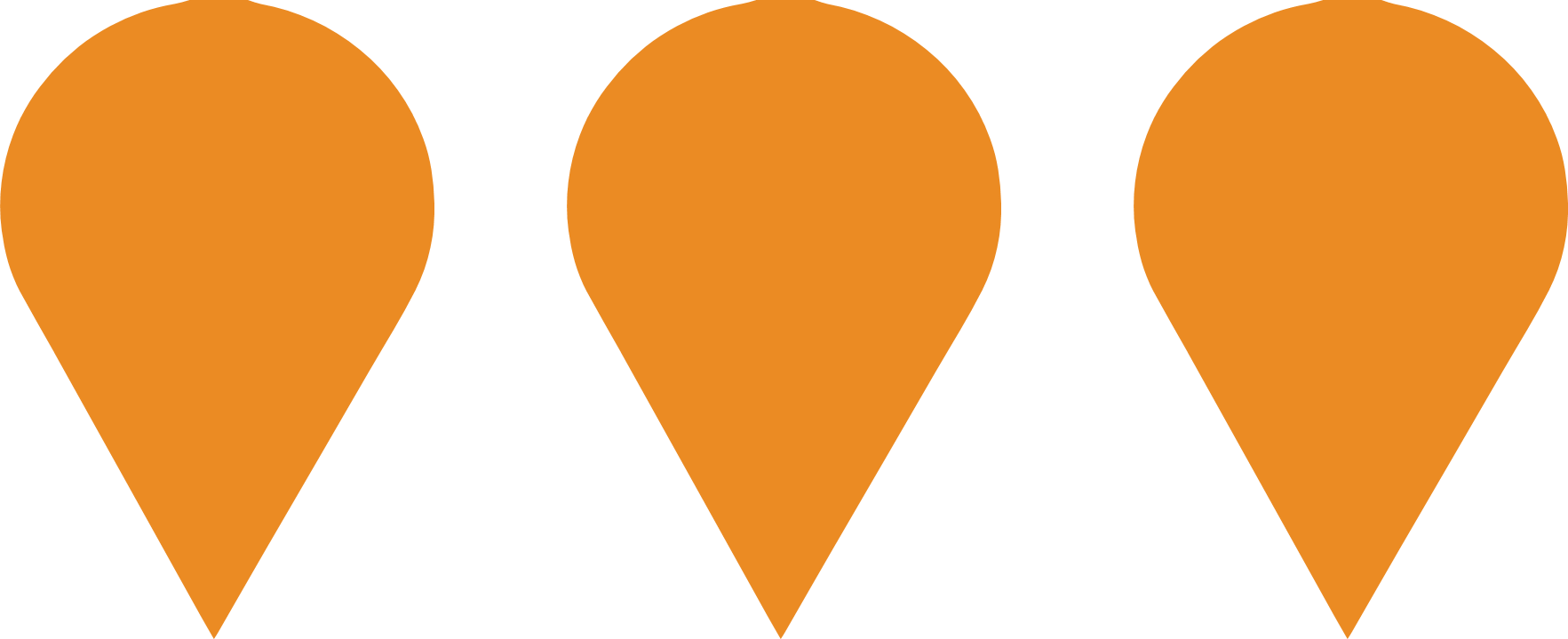 Denotes AI-based impression for illustrative purposes only, not to be taken as definitive under any circumstances. Please follow links and conduct other investigations from the project's source for actual imagery. Developers and project owners wishing us to use original imagery please Contact Us and we will do so.
Denotes AI-based impression for illustrative purposes only, not to be taken as definitive under any circumstances. Please follow links and conduct other investigations from the project's source for actual imagery. Developers and project owners wishing us to use original imagery please Contact Us and we will do so.
Frequently Asked Questions - Infrastructure
Melbourne Airport Rail (SRL Airport)
27-kilometre rail link connecting Melbourne Airport to the city via Sunshine Station and the Metro Tunnel. Trains will run every 10 minutes, connecting to the Cranbourne and Pakenham lines. The project includes a new premium station at Melbourne Airport, a new station at Keilor East, a rebuilt Albion Station, and major upgrades to create the Sunshine Superhub. Early utility relocation works are complete, and the first stage of construction, the Sunshine Superhub, is underway. The project forms part of the Suburban Rail Loop, with the route agreed to include an elevated airport station.
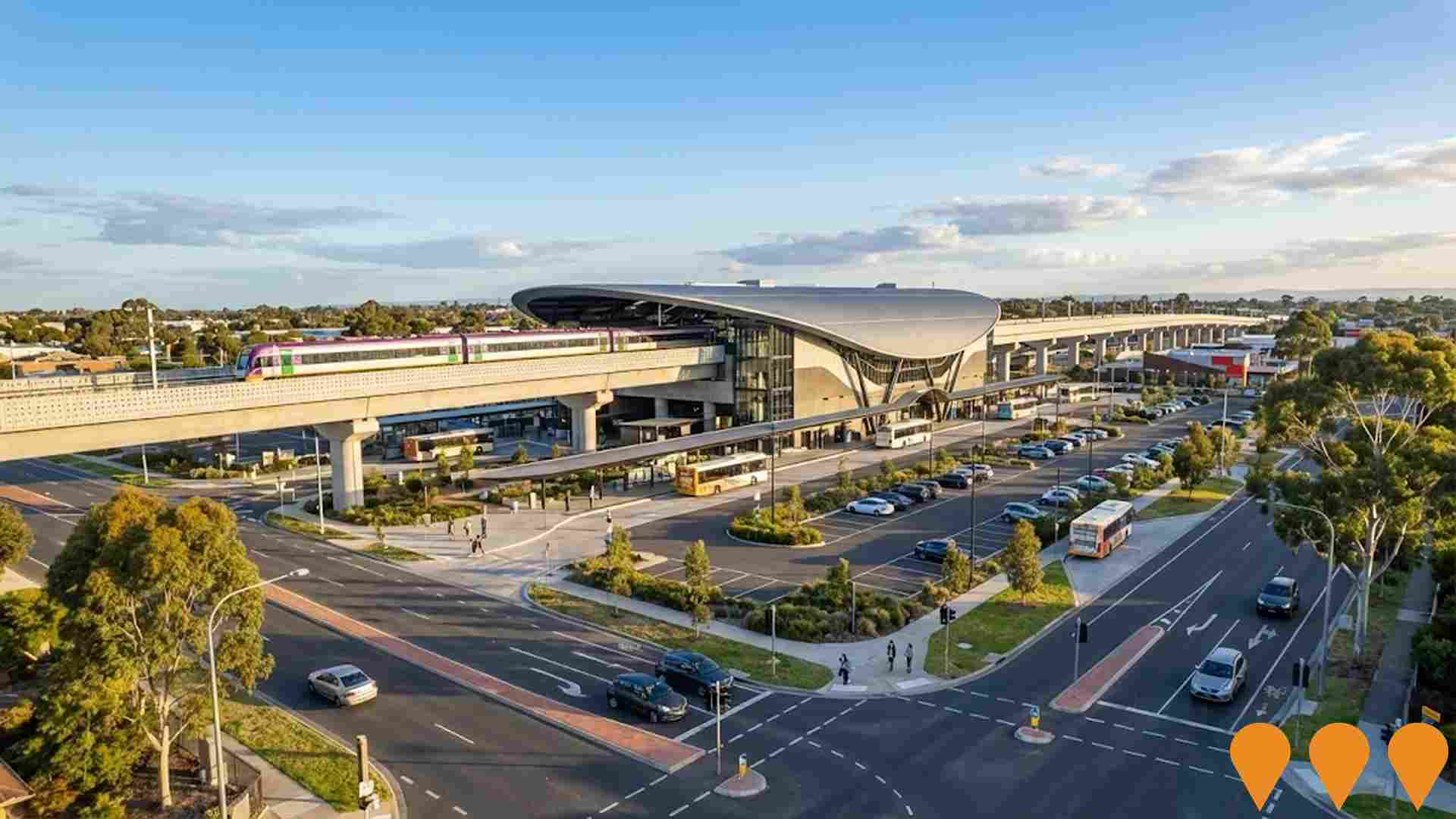
Bacchus Marsh Central
A major mixed-use town centre redevelopment delivering a new Coles supermarket, fresh food precinct, medical centre, childcare, gym and over 150 apartments in the heart of Bacchus Marsh. The project forms part of the Bacchus Marsh Town Centre Structure Plan which was adopted by the Council in September 2024 and seeks to strengthen the town center's role as the primary civic, employment, and retail precinct in the Shire. Intersection upgrades are planned nearby, moving towards construction in 2026.
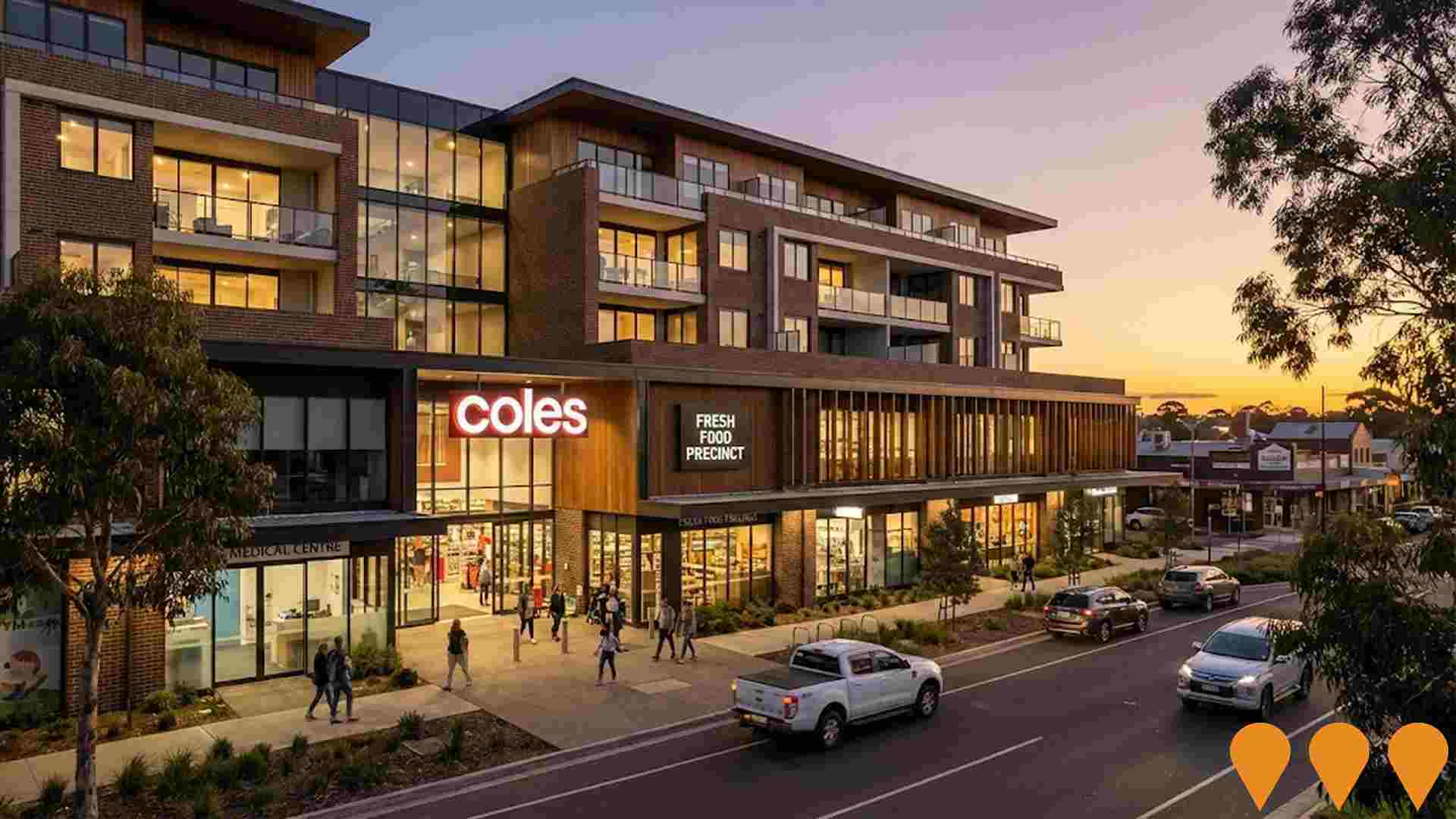
Rockbank Precinct Development
752-hectare greenfield precinct in Melbourne's west guided by the Rockbank Precinct Structure Plan. The PSP provides for more than 8,000 homes (circa 22,000 residents), a major town centre around Rockbank Station, schools, sports reserves and local infrastructure. Development is progressing across multiple private estates under the oversight of the Victorian Planning Authority and Melton City Council.
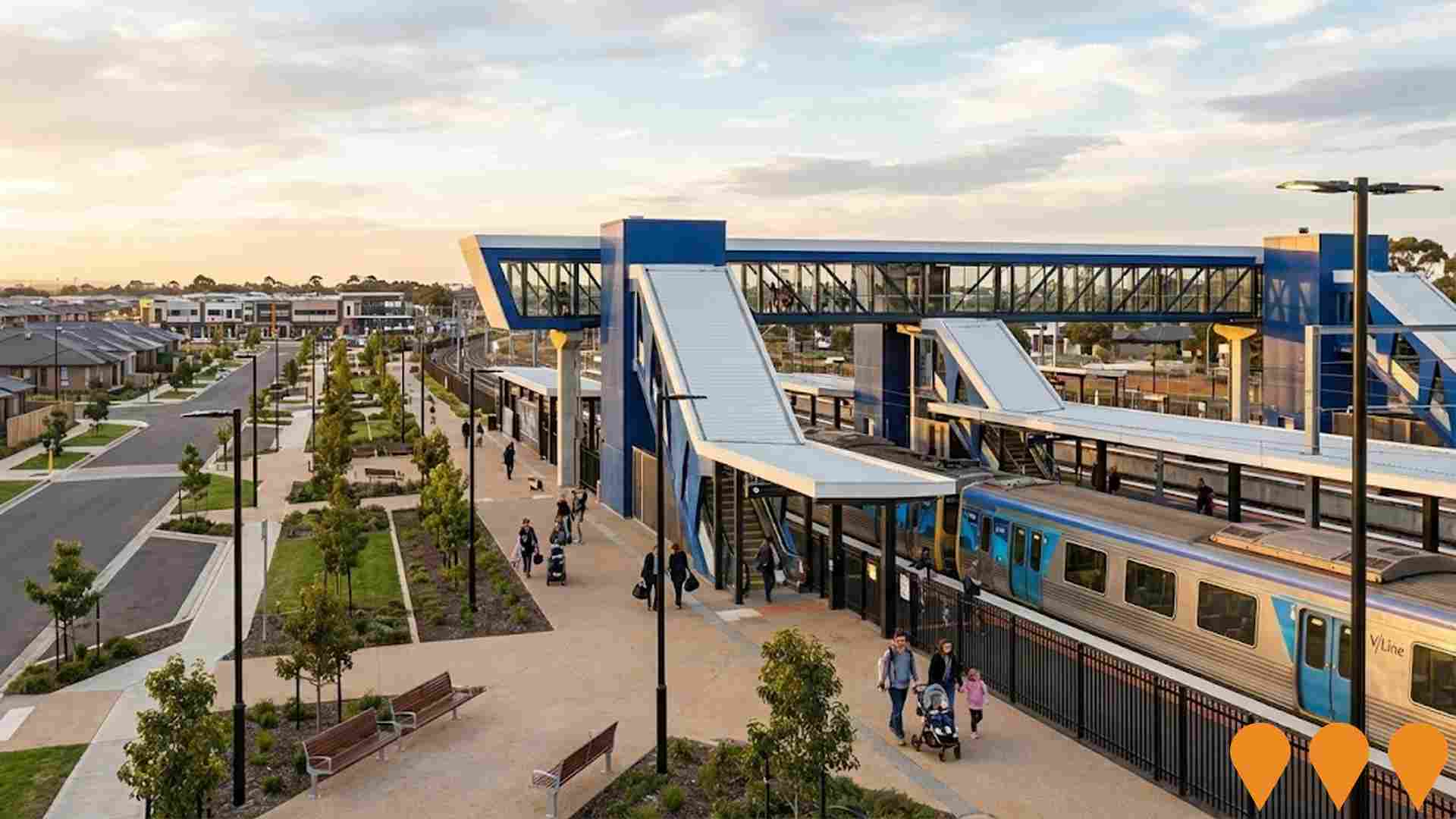
West Maddingley Early Years and Community Hub
An integrated community hub providing early years services, kindergarten places for 132 children, maternal and child health consulting rooms, multipurpose spaces, and support for families in a growing area. The project was jointly funded by Moorabool Shire Council and the Victorian State Government through the Growing Suburbs and Building Blocks funding streams. It was completed for the 2024 kindergarten year.
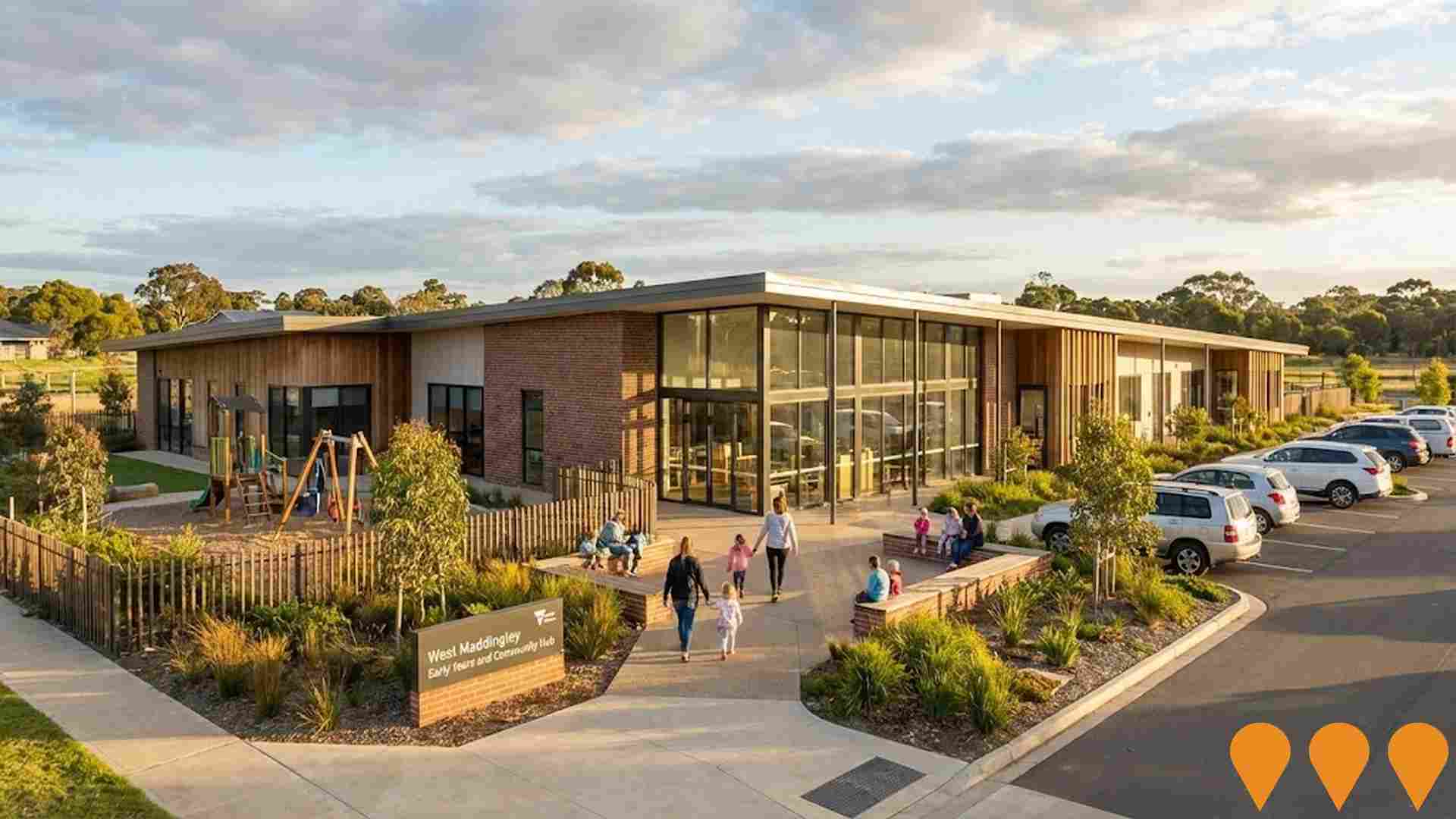
Aintree North Primary School
New primary school to serve the growing communities in Melbourne's west. Part of the Victorian Government's commitment to education infrastructure in growth areas.
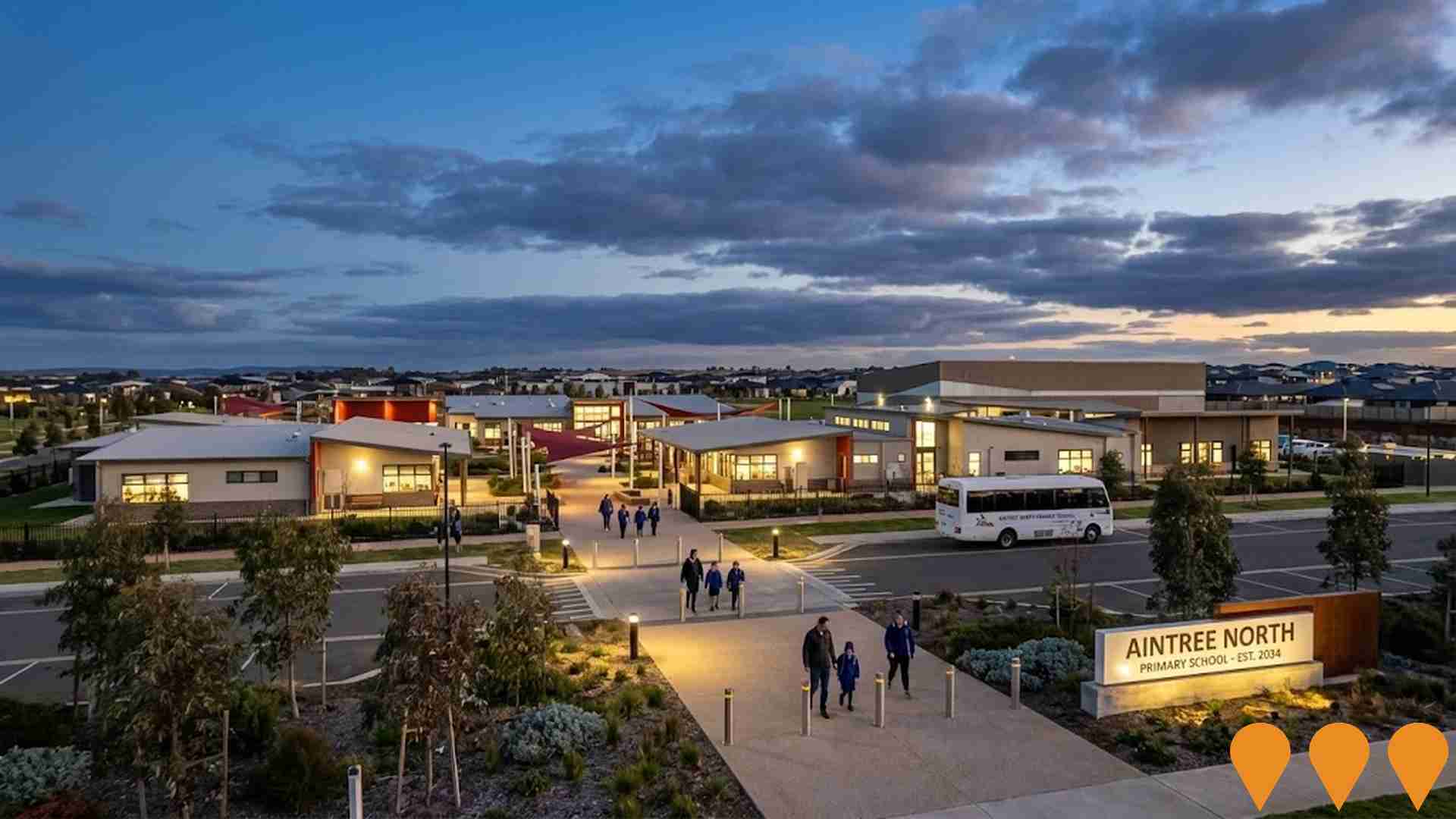
Bacchus Marsh Grammar - Maddingley Campus Expansion
Multi-stage expansion of Bacchus Marsh Grammar's Maddingley campus. Recent approvals include a new $14.5 million two-storey science faculty with laboratories, two amphitheatres, classrooms, offices, a rooftop garden, and associated external works. The expansion also recently included a new three-storey Library/Classroom facility (The Hive) and a Southern Sports Precinct with multi-use courts, as well as the acquisition of an additional 12 acres of land for playing fields and recreational space.
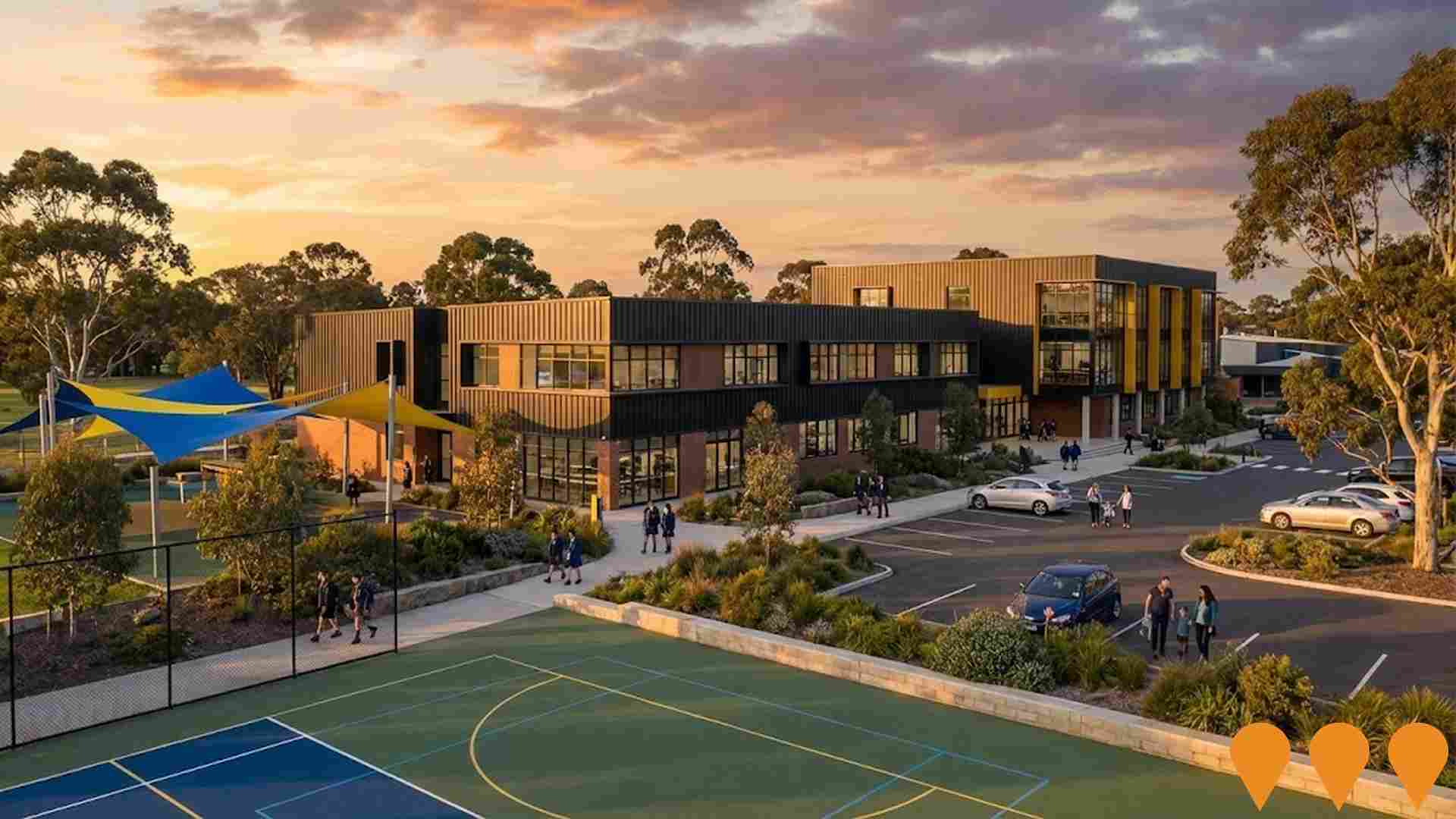
Bacchus Marsh Racecourse and Recreation Reserve Masterplan Redevelopment (Stages 2 & 3)
Major upgrade of the Bacchus Marsh Racecourse and Recreation Reserve masterplan focusing on Stages 2 and 3. Stage 2, which includes an all-abilities adventure playground, new netball and tennis courts, soccer pitches, cricket field, sports lighting, internal roads, and car parks, is largely complete (Stages 2A & 2B completed 2023-2024), with some elements like landscaping under construction. The project also includes a new Community and Multi-Sports Hub with accessible change rooms and amenities. Stage 3 will see the development of an off-leash dog park.
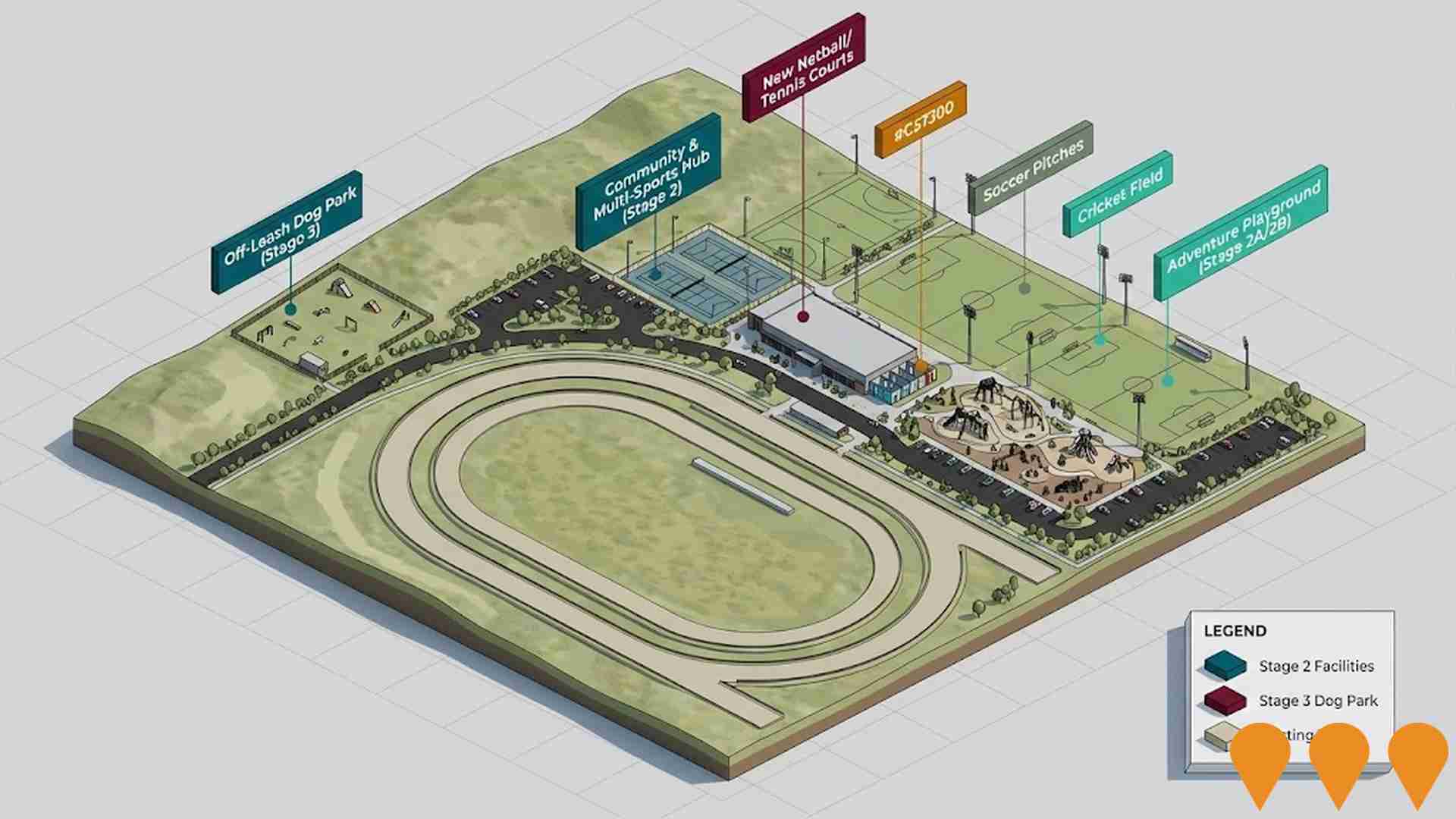
Federation Park Upgrade
A major upgrade to Federation Park in Darley. The project includes replacement of the existing playground with new equipment, a new amenities block (including accessible and gender-neutral facilities), an upgraded and sealed car park, picnic facilities, seating, a drinking fountain, new pathways, and landscaping. The project aims to enhance community recreation and accessibility while celebrating the park's historical significance, with an artistic impression on the amenities block referencing the Darley Training Camp recruits.
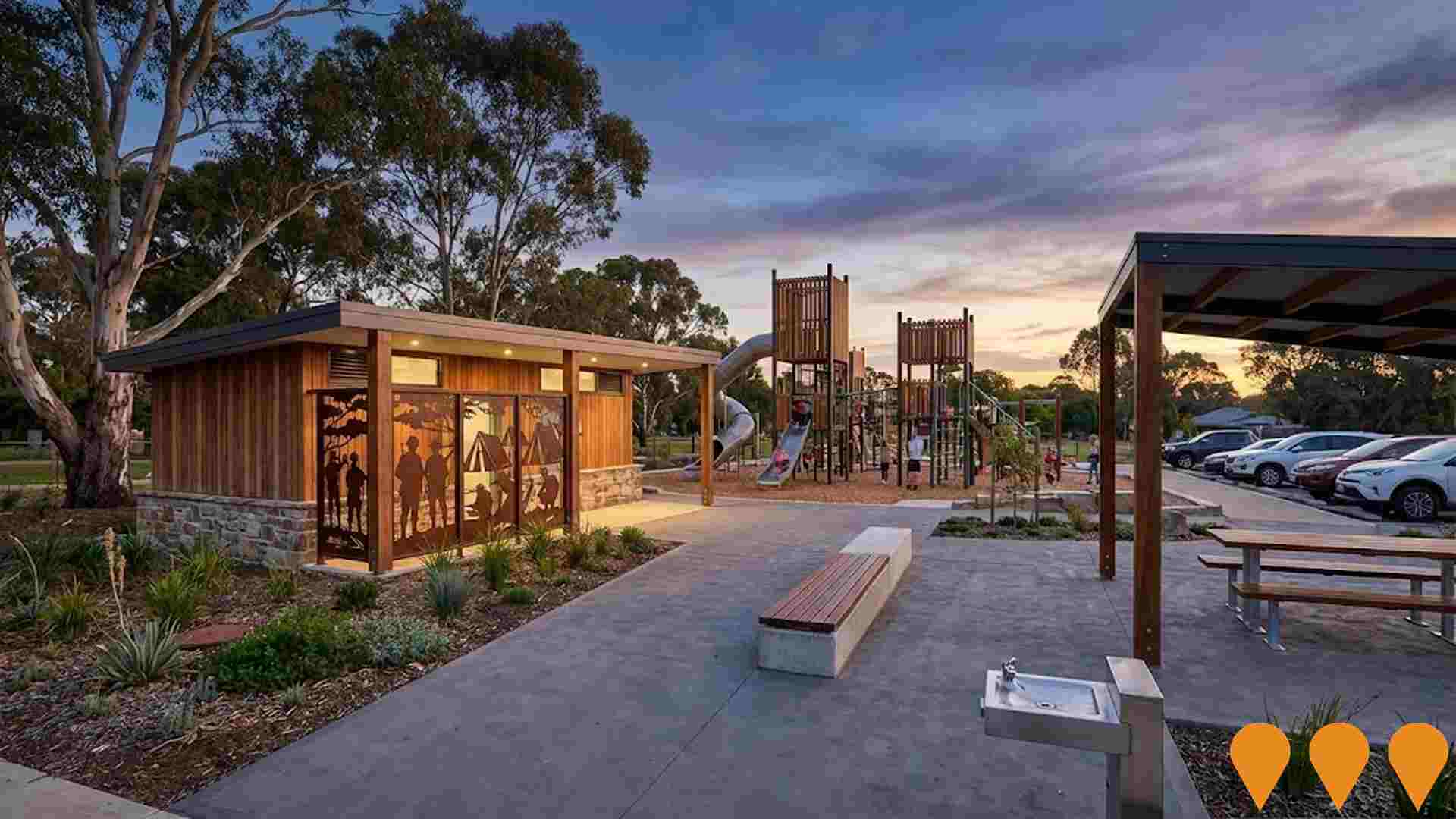
Employment
AreaSearch analysis indicates Bacchus Marsh maintains employment conditions that align with national benchmarks
Bacchus Marsh has a skilled workforce with essential services sectors well represented. The unemployment rate in the area is 4.3%, lower than Greater Melbourne's rate of 4.6%.
Employment growth over the past year was estimated at 5.1%. As of June 2025, there are 14,977 residents in work and the unemployment rate is 0.4% below Greater Melbourne's rate. Workforce participation is on par with Greater Melbourne's 64.1%. Employment among residents is concentrated in construction, health care & social assistance, and education & training.
The area has particular employment specialization in construction, with an employment share of 1.6 times the regional level. Conversely, professional & technical services show lower representation at 5.4% versus the regional average of 10.1%. Employment opportunities locally may be limited as indicated by the count of Census working population vs resident population. In the 12-month period ending June 2025, employment increased by 5.1% alongside labour force increasing by 5.8%, resulting in unemployment rising by 0.6 percentage points. This contrasts with Greater Melbourne where employment rose by 3.5%. State-level data to Nov-25 shows VIC employment grew by 1.13% year-on-year, adding 41,950 jobs, with the state unemployment rate at 4.7%, compared to the national rate of 4.3%. Jobs and Skills Australia's national employment forecasts from May-25 suggest national employment should expand by 6.6% over five years and 13.7% over ten years. Applying these projections to Bacchus Marsh's employment mix suggests local employment should increase by 6.2% over five years and 12.8% over ten years.
Frequently Asked Questions - Employment
Income
Income analysis reveals strong economic positioning, with the area outperforming 60% of locations assessed nationally by AreaSearch
AreaSearch's latest postcode level ATO data for financial year 2022 indicates Bacchus Marsh SA2 had a median income among taxpayers of $55,531 and an average of $70,022. These figures are higher than the national averages. Compared to Greater Melbourne's median of $54,892 and average of $73,761, Bacchus Marsh's incomes are slightly higher. Based on Wage Price Index growth of 12.16% since financial year 2022, estimated incomes for September 2025 would be approximately $62,284 (median) and $78,537 (average). Census data shows Bacchus Marsh's household, family, and personal incomes cluster around the 53rd percentile nationally. Income distribution reveals that 34.5% of individuals in Bacchus Marsh earn between $1,500 - 2,999 annually, similar to regional levels at 32.8%. After housing expenses, 85.1% of income remains for other costs. The area's SEIFA income ranking places it in the fifth decile.
Frequently Asked Questions - Income
Housing
Bacchus Marsh is characterized by a predominantly suburban housing profile, with above-average rates of outright home ownership
The dwelling structure in Bacchus Marsh, as per the latest Census, consisted of 90.2% houses and 9.7% other dwellings (semi-detached, apartments, 'other' dwellings). This compares to Melbourne metro's 90.9% houses and 9.1% other dwellings. The home ownership level in Bacchus Marsh was higher at 29.4%, with the rest being mortgaged (49.4%) or rented (21.3%). The median monthly mortgage repayment in the area was $1,733, lower than Melbourne metro's $1,800. The median weekly rent figure was recorded at $340, compared to Melbourne metro's $351. Nationally, Bacchus Marsh's mortgage repayments are lower than the Australian average of $1,863, while rents are less than the national figure of $375.
Frequently Asked Questions - Housing
Household Composition
Bacchus Marsh has a typical household mix, with a lower-than-average median household size
Family households account for 75.4% of all households, including 35.2% couples with children, 26.8% couples without children, and 12.4% single parent families. Non-family households make up the remaining 24.6%, with lone person households at 22.8% and group households comprising 1.9%. The median household size is 2.7 people, which is smaller than the Greater Melbourne average of 3.0.
Frequently Asked Questions - Households
Local Schools & Education
Educational attainment in Bacchus Marsh aligns closely with national averages, showing typical qualification patterns and performance metrics
The area's university qualification rate is 19.8%, significantly lower than Greater Melbourne's average of 37.0%. Bachelor degrees are the most common at 13.2%, followed by postgraduate qualifications (3.9%) and graduate diplomas (2.7%). Vocational credentials are prevalent, with 39.5% of residents aged 15+ holding them, including advanced diplomas (11.9%) and certificates (27.6%). Educational participation is high, with 29.1% currently enrolled in formal education, comprising 11.1% in primary, 7.7% in secondary, and 3.7% in tertiary education.
Educational participation is notably high, with 29.1% of residents currently enrolled in formal education. This includes 11.1% in primary education, 7.7% in secondary education, and 3.7% pursuing tertiary education.
Frequently Asked Questions - Education
Schools Detail
Nearby Services & Amenities
Transport
Transport servicing is low compared to other areas nationally based on assessment of service frequency, route connectivity and accessibility
Transport analysis shows 81 active stops in Bacchus Marsh, offering a mix of train and bus services. These are covered by 14 routes, serving 2023 weekly passenger trips. Accessibility is moderate, with residents on average 440 meters from the nearest stop.
Services run at an average frequency of 289 trips per day across all routes, equating to about 24 weekly trips per stop.
Frequently Asked Questions - Transport
Transport Stops Detail
Health
Health performance in Bacchus Marsh is lower than average with common health conditions somewhat prevalent across the board, though to a considerably higher degree among older age cohorts
Bacchus Marsh faces significant health challenges with common health conditions prevalent across all age groups but particularly high among older cohorts. Approximately 54% of Bacchus Marsh's total population (~14,815 people) has private health cover, compared to 50.8% in Greater Melbourne.
Mental health issues and asthma are the most common medical conditions in the area, affecting 9.5% and 9.2% of residents respectively. A total of 66.0% of Bacchus Marsh residents report having no medical ailments, compared to 73.7% across Greater Melbourne. As of 2016, 16.7% of Bacchus Marsh's population is aged 65 and over (4,553 people), higher than the 10.1% in Greater Melbourne. Health outcomes among seniors require more attention due to these challenges.
Frequently Asked Questions - Health
Cultural Diversity
Bacchus Marsh ranks below the Australian average when compared to other local markets across a number of language and cultural background related metrics
Bacchus Marsh, as of the Census conducted on 27 June 2016, had a population with 83.7% born in Australia, 89.2% being citizens, and 89.8% speaking English only at home. Christianity was the predominant religion, accounting for 46.0%. The category 'Other' made up 2.5%, compared to Greater Melbourne's 5.6%.
Regarding ancestry, Australian was the top group with 28.3%, followed by English at 27.9% and Irish at 8.4%. Notably, Maltese (3.2%) and Croatian (0.8%) were overrepresented compared to regional averages of 5.1% and 1.4%, respectively.
Frequently Asked Questions - Diversity
Age
Bacchus Marsh's population is slightly younger than the national pattern
Bacchus Marsh's median age is 37 years, matching Greater Melbourne and closely resembling Australia's 38 years. The 5-14 age group comprises 13.6%, higher than Greater Melbourne, while the 25-34 cohort stands at 14.0%. Between 2021 and present, the 35 to 44 age group grew from 13.9% to 15.2%, and the 75 to 84 group increased from 4.8% to 6.0%. Conversely, the 45 to 54 cohort decreased from 12.7% to 12.1%. By 2041, demographic projections indicate significant shifts in Bacchus Marsh's age structure. The 45-54 group is projected to grow by 37%, adding 1,205 people, reaching 4,501 from 3,295. Meanwhile, the 0-4 cohort grows modestly by 4% (63 people).
